-
 Bitcoin
Bitcoin $84,705.5206
1.96% -
 Ethereum
Ethereum $1,882.8342
2.59% -
 Tether USDt
Tether USDt $0.9999
-0.02% -
 XRP
XRP $2.1020
-0.02% -
 BNB
BNB $603.8511
-0.82% -
 Solana
Solana $124.7702
-1.25% -
 USDC
USDC $0.9999
-0.01% -
 Dogecoin
Dogecoin $0.1717
1.76% -
 Cardano
Cardano $0.6717
0.25% -
 TRON
TRON $0.2380
0.73% -
 Toncoin
Toncoin $3.9856
-3.94% -
 Chainlink
Chainlink $13.7866
0.95% -
 UNUS SED LEO
UNUS SED LEO $9.4087
2.25% -
 Stellar
Stellar $0.2691
1.18% -
 Avalanche
Avalanche $19.3533
1.55% -
 Sui
Sui $2.3689
0.72% -
 Shiba Inu
Shiba Inu $0.0...01244
-1.74% -
 Hedera
Hedera $0.1666
1.40% -
 Polkadot
Polkadot $4.1088
0.73% -
 Litecoin
Litecoin $83.2182
-0.74% -
 MANTRA
MANTRA $6.2222
-1.29% -
 Bitcoin Cash
Bitcoin Cash $306.0723
0.08% -
 Bitget Token
Bitget Token $4.6091
0.13% -
 Dai
Dai $1.0000
0.02% -
 Ethena USDe
Ethena USDe $0.9999
-0.01% -
 Pi
Pi $0.6919
-3.31% -
 Hyperliquid
Hyperliquid $13.1957
-3.08% -
 Monero
Monero $219.3099
1.05% -
 Uniswap
Uniswap $6.1691
2.09% -
 Pepe
Pepe $0.0...07614
3.60%
how to buy and sell bitcoin in india
Buying and selling Bitcoin in India requires navigating evolving regulations; choose reputable exchanges, understand the risks (including price volatility), and prioritize account security.
Mar 23, 2025 at 09:35 pm
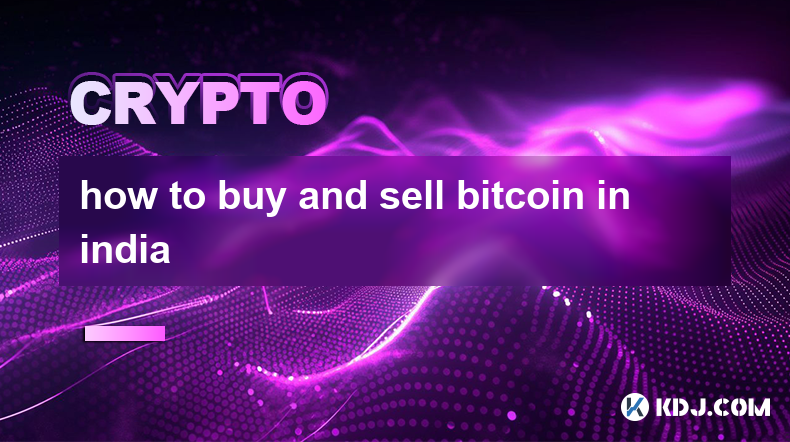
How to Buy and Sell Bitcoin in India
Buying and selling Bitcoin in India involves navigating a regulatory landscape that's still evolving. While not explicitly banned, there's a lack of clear, comprehensive legislation specifically addressing cryptocurrencies. This means understanding the risks and choosing reputable platforms is crucial. The process itself isn't overly complicated, but requires careful consideration and due diligence.
Choosing an Exchange:
The first step is selecting a cryptocurrency exchange operating in India. Several exchanges cater to the Indian market, each with its own fees, security measures, and features. Consider factors like trading volume, security reputation, user interface, and available customer support before making your choice. Research reviews and compare offerings to find the best fit for your needs and risk tolerance.
Account Creation and Verification:
Once you've chosen an exchange, you'll need to create an account. This usually involves providing personal information like your name, address, and proof of identification. KYC (Know Your Customer) and AML (Anti-Money Laundering) regulations require exchanges to verify user identities to comply with Indian financial regulations. This verification process might take some time, so be patient.
Funding Your Account:
After your account is verified, you need to deposit funds. Most Indian exchanges support INR (Indian Rupee) deposits via various methods, including bank transfers, UPI (Unified Payments Interface), and net banking. The specific options available will depend on the exchange you choose. Carefully review the deposit limits and any associated fees.
Buying Bitcoin:
Once your account is funded, you can finally buy Bitcoin. Simply navigate to the Bitcoin trading section of your chosen exchange. You'll see the current market price and can place an order to buy a specific amount of Bitcoin. You can choose between market orders (buying at the current market price) or limit orders (buying at a specified price).
Selling Bitcoin:
Selling Bitcoin is the reverse process. Navigate to the Bitcoin trading section, and place a sell order. Similar to buying, you can choose between market and limit orders. Once your order is executed, the equivalent INR value will be credited to your exchange account.
Withdrawing Funds:
After selling your Bitcoin, you can withdraw your INR from the exchange back to your bank account. The withdrawal process might involve verifying your bank details and potentially incurring fees. Always double-check the withdrawal instructions provided by your exchange to ensure a smooth transaction.
Understanding Risks:
The cryptocurrency market is inherently volatile. Bitcoin's price can fluctuate significantly in short periods. Investing in Bitcoin carries substantial risk of loss. Only invest what you can afford to lose, and never invest based on hype or speculation. Diversification is crucial in any investment portfolio.
Security Best Practices:
Secure your exchange account with a strong, unique password and enable two-factor authentication (2FA) whenever possible. Be cautious of phishing scams and avoid sharing your login credentials with anyone. Regularly review your account activity for any unauthorized transactions.
Tax Implications:
In India, the tax treatment of cryptocurrency transactions is still evolving. It’s advisable to consult with a tax professional to understand your tax obligations regarding Bitcoin gains and losses. Keeping accurate records of all your transactions is crucial for tax compliance.
Alternative Methods:
While exchanges are the most common way to buy and sell Bitcoin in India, peer-to-peer (P2P) platforms are also an option. These platforms connect buyers and sellers directly, often bypassing the need for an intermediary exchange. However, P2P transactions carry higher risks, particularly concerning security and fraud.
Using a Hardware Wallet:
Once you've accumulated a significant amount of Bitcoin, consider transferring it to a hardware wallet for enhanced security. Hardware wallets provide a higher level of protection against hacking and theft compared to keeping your Bitcoin on an exchange.
Staying Informed:
The cryptocurrency market is constantly changing. Stay informed about the latest news, regulations, and technological developments to make informed investment decisions. Regularly research and update your knowledge on cryptocurrency trading and investment strategies.
Frequently Asked Questions:
Q: Is Bitcoin legal in India?
A: Bitcoin is not explicitly banned in India, but its regulatory status remains unclear. The government is currently developing a comprehensive regulatory framework.
Q: What are the fees involved in buying and selling Bitcoin in India?
A: Fees vary depending on the exchange, including deposit fees, trading fees, and withdrawal fees. Check the specific fee schedule of your chosen exchange.
Q: How long does it take to verify my account on an Indian cryptocurrency exchange?
A: Verification times vary, but it can typically take anywhere from a few hours to a few days.
Q: Are there any tax implications for buying and selling Bitcoin in India?
A: Yes, there are tax implications. Consult a tax professional for advice on your specific situation. Currently, income from cryptocurrency transactions is taxed as income from other sources.
Q: What are the risks involved in buying and selling Bitcoin in India?
A: The primary risk is the volatility of the Bitcoin price. There are also risks associated with exchange security and potential regulatory changes.
Q: What is a hardware wallet, and why should I use one?
A: A hardware wallet is a physical device designed to store cryptocurrency offline, offering enhanced security compared to software wallets. It’s recommended for larger holdings.
Q: What are peer-to-peer (P2P) platforms, and are they safe?
A: P2P platforms connect buyers and sellers directly. While they can offer competitive prices, they carry higher risks related to security and fraud compared to regulated exchanges.
Disclaimer:info@kdj.com
The information provided is not trading advice. kdj.com does not assume any responsibility for any investments made based on the information provided in this article. Cryptocurrencies are highly volatile and it is highly recommended that you invest with caution after thorough research!
If you believe that the content used on this website infringes your copyright, please contact us immediately (info@kdj.com) and we will delete it promptly.
- Santiment Released Data Offering Insights for Spotting Market Dips
- 2025-04-02 11:35:12
- Have You Ever Wondered What It Would Be Like to Invest in the Next Big Meme Coin Before It Skyrockets?
- 2025-04-02 11:35:12
- Circle, the company behind the USDC stablecoin, has filed for an initial public offering and plans to list its shares on the New York Stock Exchange
- 2025-04-02 11:30:12
- Circle, the company behind USDC stablecoin, has filed for an initial public offering and plans to list on the New York Stock Exchange
- 2025-04-02 11:30:12
- Circle, the company behind the USDC stablecoin, has filed for an initial public offering and plans to list on the New York Stock Exchange.
- 2025-04-02 11:25:12
- Hyperliquid's Centralized Twist Exposes the Paradox of Decentralized Finance
- 2025-04-02 11:25:12
Related knowledge
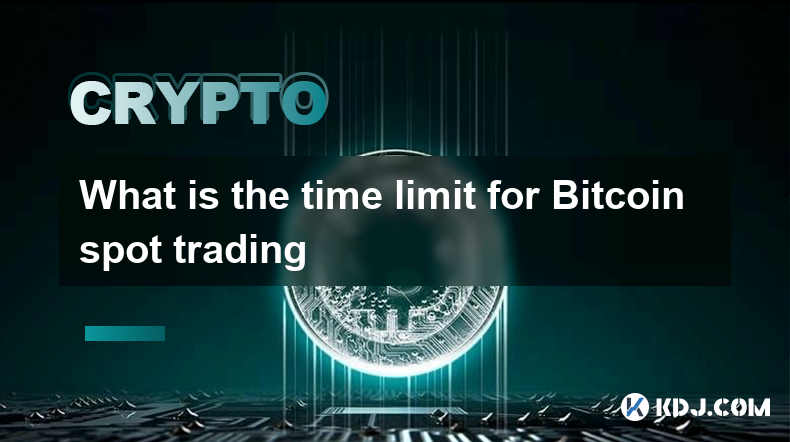
What is the time limit for Bitcoin spot trading
Mar 30,2025 at 10:43am
? There's no single, universally applicable 'time limit' for Bitcoin spot trading. Unlike futures contracts which have defined expiration dates, spot trading involves the immediate exchange of Bitcoin for fiat currency (or vice versa). The transaction is executed almost instantly, pending confirmation on the Bitcoin blockchain. However, several factors ...
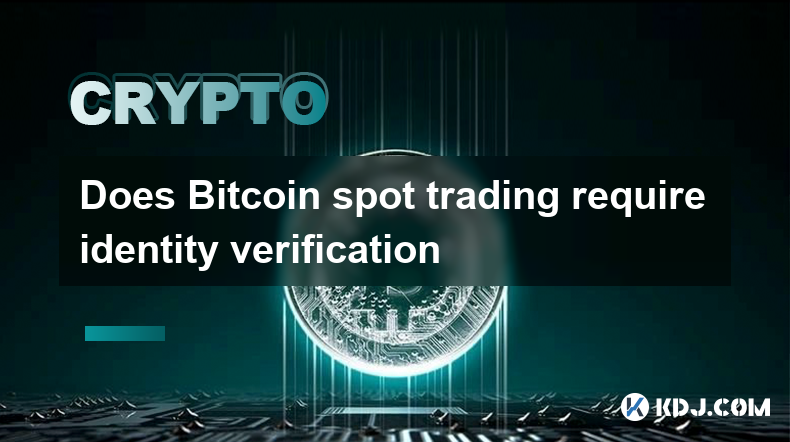
Does Bitcoin spot trading require identity verification
Mar 31,2025 at 06:08am
? Understanding KYC/AML Regulations in Crypto ExchangesThe question of whether Bitcoin spot trading requires identity verification hinges largely on the exchange you're using. There's no universal requirement for identity verification to trade Bitcoin spot. However, most reputable and larger exchanges operating globally implement Know Your Customer (KYC...
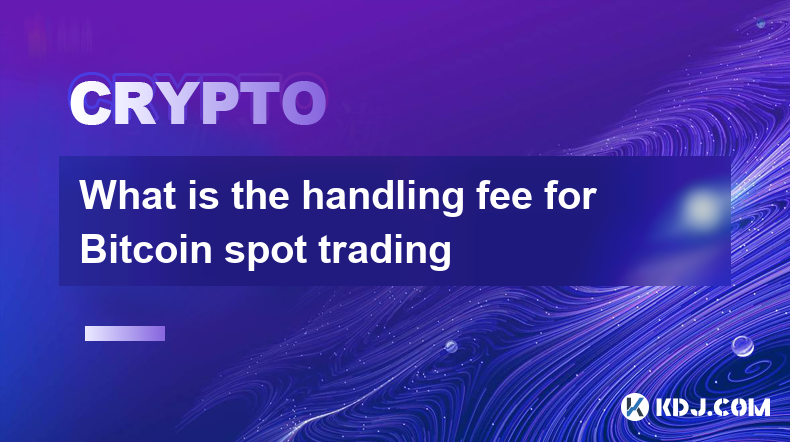
What is the handling fee for Bitcoin spot trading
Apr 02,2025 at 12:28am
? Understanding Bitcoin Spot Trading FeesBitcoin spot trading involves the immediate exchange of Bitcoin for another currency, typically fiat money like USD or another cryptocurrency. Unlike futures or derivatives trading, spot trading executes the transaction at the current market price. The handling fee, therefore, covers the services provided by the ...
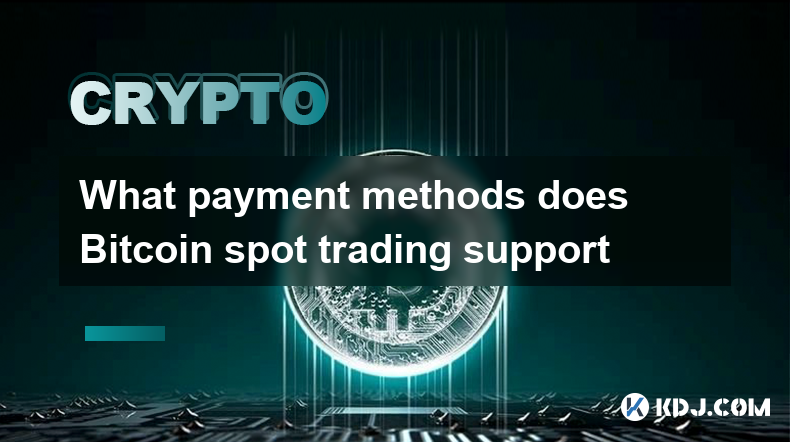
What payment methods does Bitcoin spot trading support
Mar 30,2025 at 12:43pm
? Understanding Bitcoin Spot Trading Payment MethodsBitcoin spot trading refers to the immediate exchange of Bitcoin (BTC) for another currency, typically fiat money like USD, EUR, or another cryptocurrency. Unlike futures or derivatives trading, spot trading involves the actual transfer of Bitcoin at the current market price. The payment methods accept...
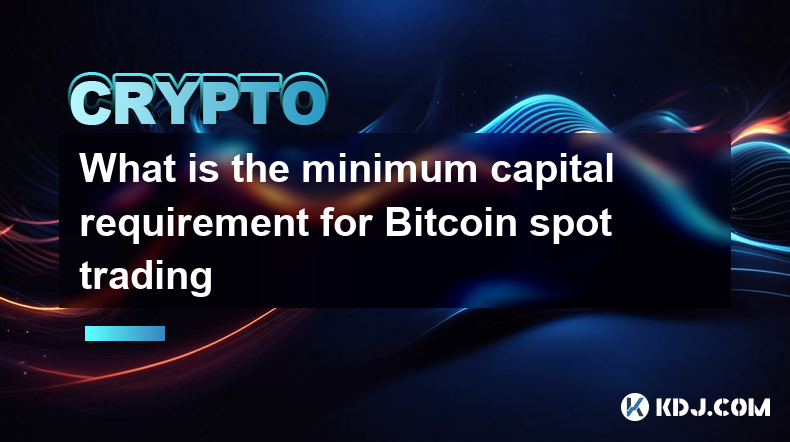
What is the minimum capital requirement for Bitcoin spot trading
Apr 01,2025 at 06:50pm
? Understanding Bitcoin Spot Trading and Capital RequirementsBitcoin spot trading refers to the immediate exchange of Bitcoin for another currency, typically fiat money like USD or another cryptocurrency. Unlike futures or derivatives trading, spot trading involves the actual ownership of Bitcoin at the moment of the transaction. There's no speculation ...
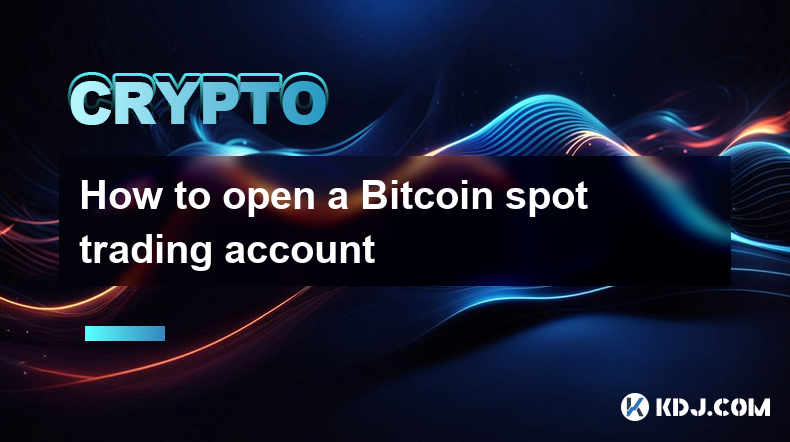
How to open a Bitcoin spot trading account
Mar 29,2025 at 12:43pm
Choosing the Right ExchangeOpening a Bitcoin spot trading account involves selecting a reputable cryptocurrency exchange. Several factors are crucial here. Consider the exchange's security features – look for two-factor authentication (2FA) and robust security protocols. Examine trading fees, as these can significantly impact your profits. Check the av...

What is the time limit for Bitcoin spot trading
Mar 30,2025 at 10:43am
? There's no single, universally applicable 'time limit' for Bitcoin spot trading. Unlike futures contracts which have defined expiration dates, spot trading involves the immediate exchange of Bitcoin for fiat currency (or vice versa). The transaction is executed almost instantly, pending confirmation on the Bitcoin blockchain. However, several factors ...

Does Bitcoin spot trading require identity verification
Mar 31,2025 at 06:08am
? Understanding KYC/AML Regulations in Crypto ExchangesThe question of whether Bitcoin spot trading requires identity verification hinges largely on the exchange you're using. There's no universal requirement for identity verification to trade Bitcoin spot. However, most reputable and larger exchanges operating globally implement Know Your Customer (KYC...

What is the handling fee for Bitcoin spot trading
Apr 02,2025 at 12:28am
? Understanding Bitcoin Spot Trading FeesBitcoin spot trading involves the immediate exchange of Bitcoin for another currency, typically fiat money like USD or another cryptocurrency. Unlike futures or derivatives trading, spot trading executes the transaction at the current market price. The handling fee, therefore, covers the services provided by the ...

What payment methods does Bitcoin spot trading support
Mar 30,2025 at 12:43pm
? Understanding Bitcoin Spot Trading Payment MethodsBitcoin spot trading refers to the immediate exchange of Bitcoin (BTC) for another currency, typically fiat money like USD, EUR, or another cryptocurrency. Unlike futures or derivatives trading, spot trading involves the actual transfer of Bitcoin at the current market price. The payment methods accept...

What is the minimum capital requirement for Bitcoin spot trading
Apr 01,2025 at 06:50pm
? Understanding Bitcoin Spot Trading and Capital RequirementsBitcoin spot trading refers to the immediate exchange of Bitcoin for another currency, typically fiat money like USD or another cryptocurrency. Unlike futures or derivatives trading, spot trading involves the actual ownership of Bitcoin at the moment of the transaction. There's no speculation ...

How to open a Bitcoin spot trading account
Mar 29,2025 at 12:43pm
Choosing the Right ExchangeOpening a Bitcoin spot trading account involves selecting a reputable cryptocurrency exchange. Several factors are crucial here. Consider the exchange's security features – look for two-factor authentication (2FA) and robust security protocols. Examine trading fees, as these can significantly impact your profits. Check the av...
See all articles






















































































